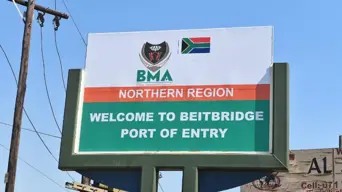BMA drones lead to over 1,500 arrests at Beitbridge over Easter weekend
Commissioner Michael Masiapato explains that the drones provide real-time surveillance of high-risk areas along the border.

The Beitbridge Border Post in Musina, Limpopo. Picture: X/PresidencyZA
702's Bongani Bingwa interviews Dr Michael Masiapato, Commissioner of the Border Management Authority (BMA).
Listen below:
More than 1,500 undocumented migrants were apprehended at the Beitbridge border crossing between South Africa and Zimbabwe over the Easter weekend, according to the Border Management Authority (BMA).
The BMA attributes the high number of arrests to its recent deployment of drone technology.
Commissioner Michael Masiapato explains that these drones, capable of flying at speeds exceeding 45km/h, provide real-time surveillance of high-risk areas along the border.
He says that these drones provide a clear picture of what’s happening in vulnerable zones.
Border guards are also equipped with body cameras that not only record activity, but also enable real-time communication, further improving coordination and response effectiveness.
"We are able to send them geolocation in terms of where people are trying to enter, and on that basis they're able to respond directly to that particular space, and they're able to intercept those individuals."
- Dr Michael Masiapato, Commissioner – Border Management Authority
The BMA, in collaboration with SAPS and SANDF, successfully intercepted individuals attempting to enter South Africa unlawfully through the detection of drones. This coordinated effort also led to the apprehension of facilitators and the confiscation of illicit goods in the… pic.twitter.com/FFK2lwjbrk
— The Border Management Authority SA (@TheBMA_SA) April 21, 2025
Masiapato says that prior to the use of drones, identifying the individuals orchestrating illegal crossings was nearly impossible.
Now, the BMA is able to track the coordinators – the people leading the undocumented migrants.
Masiapato emphasises that once identified, these coordinators are not simply deported. Instead, they are taken to a police station where a criminal case is opened against them.
"Our intention going forward is to identify the facilitators, including the taxis and private vehicles."
- Dr Michael Masiapato, Commissioner – Border Management Authority
Scroll up to the audio player to listen to the interview.